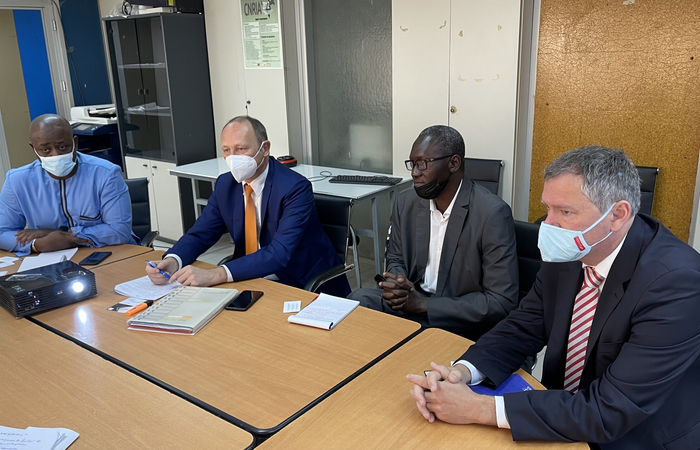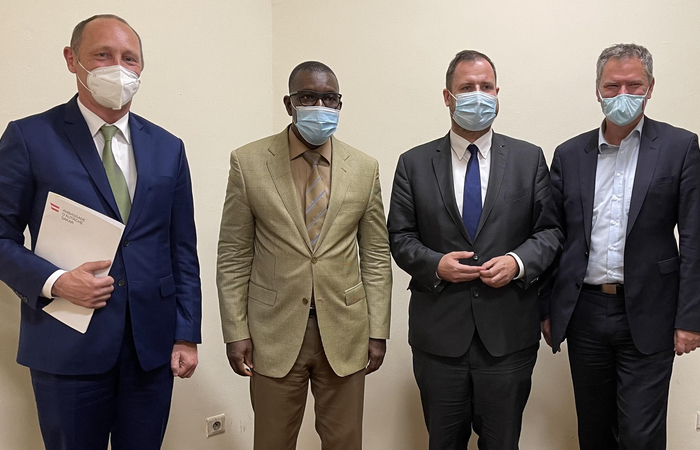Teaching and Research in Senegal and Mali
Educational policy exchange with Africa
As part of the Africa focus in the international education work of the FPÖ Education Institute, which focuses on exchange and the development of bilateral relationships for the international education sector and global networking activities, an education policy delegation trip to the African countries of Senegal and Mali took place from April 27, 2021 to May 5, 2021: The Freedom Party delegation consisted of National Council members MMMag. Dr. Axel Kassegger (Foreign Policy Spokesperson and Chairman of the Parliamentary Friendship Group Austria - Sub-Saharan Africa), Christian Hafenecker (Chairman of the Committee for Research, Innovation and Digitization) and KD Deputy DI Walter Asperl (Consultant for Education, Science and Research).
With around 80,000 students and 1,500 lecturers in 8 faculties, the Universite Cheikh Anta Diop Dakar is the largest and most prestigious university in Senegal. In a conversation with the Director of International Cooperation Prof. Dr. Ndiak Fall and the Director of the Institute of Geosciences Prof. Dr. Abdoul Aziz Ndiaye, the effects of the Corona crisis on teaching and research were discussed, the university was completely closed for a total of 6 months. There is only cooperation between the University of Cheikh Anta Diop and Austrian universities at student exchange level within the framework of Erasmus-plus. The Austrian Africa-UniNet program for the promotion of cooperation between Austrian and African universities in the area of teacher exchange and research was presented and received with great interest. According to Prof. Dr. Ndiak Fall, there is a particular need for research cooperation and infrastructure equipment for engineering sciences (laboratories, etc.).
During the working discussions in the Senegalese National Assembly with Mr. Papa Biram Toure, Chairman of the Foreign Affairs Committee, Mr. Alioune Badara Diouf, Chairman of the Defence and Security Committee and Mr. Bouama Sall, Chairman of the Education and Youth Committee, the "Plan Senegal Emergent (PSE)" of President Macky Sall was discussed in detail, which provides for the strategic further development of the country based on 6 priority areas. One of these priority areas is "vocational training" and once again the Austrian showcase models of "dual training" and practice-oriented higher education within the framework of "universities of applied sciences" were presented in detail and met with great interest. In addition to a presentation of the ongoing "decentralization" projects in Senegal, the committee chairwoman's observation that it is primarily uneducated or poorly educated Senegalese who embark on the path of migration to Europe is particularly noteworthy and a clear indication of the importance of promoting local education in connection with the issue of migration.
In a working meeting with the Minister of Science and Research, Prof. Amadou Keita, he explained the development of the higher education system in Mali. According to Prof. Keita, there was no university at all in Mail until 1995, only an administrative academy, a pedagogical academy and a university for engineers and doctors. Since the founding of the first university, the Université du Mali, in 1995, five more universities have been founded in the country. The "Plan de Transistion" provides for the establishment of a further 3 universities. The biggest problems of the state-funded university sector in Mali are the lack of suitable teaching staff and the comparatively high unemployment rate among graduates. In addition to the state universities, there are a large number of privately financed schools and universities in Mali, some of which are of very good quality and are often financed from abroad. Minister Prof. Keita was also unaware of the Austrian Africa-UniNet program to promote cooperation between Austrian and African universities in the field of teacher exchange and research, and direct contact has since been established between the Austrian Ministry of Science and the Malian Ministry of Science of the transitional government.

